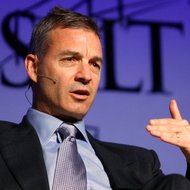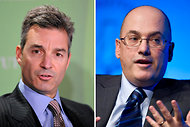 Stephen Lam/ReutersMarissa Mayer, chief of Yahoo.
Stephen Lam/ReutersMarissa Mayer, chief of Yahoo. Steve Marcus/ReutersDaniel S. Loeb, manager of the hedge fund Third Point.
Steve Marcus/ReutersDaniel S. Loeb, manager of the hedge fund Third Point.
Yahoo announced a number of changes to its board on Thursday, including the addition of Max Levchin, a co-founder of PayPal.
The company also said two directors were stepping down: Brad Smith, the chief executive of Intuit, and David W. Kenny, chief executive of the Weather Channel.
Yahoo’s latest board changes signal its continued push to become a top technology company once more, a strategy it began in July, when it hired Marissa Mayer away from Google to become its new chief executive.
Revolving Door
View all posts
Since taking over, Ms. Mayer has emphasized ways to modernize Yahoo staples like its e-mail and the Flickr photo service, to help the company square off against ever-newer competitors.
Bringing in Mr. Levchin is intended to help with that push and show a commitment to developing enticing new offerings. He served as PayPal’s chief technology officer before forming Slide, a company that eventually helped produce Web applications for Facebook. Google bought Slide for about $180 million two years ago, and Mr. Levchin left the Internet giant when it closed Slide last year.
“Max is someone I’ve admired throughout my career for his phenomenal sense for great products and keen focus on user experiences,” Ms. Mayer said in a statement. “I’m confident that his strong product and technology expertise will be a tremendous asset to Yahoo as we work to transform the world’s daily habits.”
He will serve as the fourth director nominated by Daniel S. Loeb, the activist hedge fund manager who joined Yahoo’s board in May after mounting a prominent challenge to the company’s directors. Mr. Loeb’s other directors, besides himself, are Michael J. Wolf, a media consultant, and Harry J. Wilson, a turnaround expert who served on the Obama administration’s automotive task force.
Since joining Yahoo’s board, Mr. Loeb has helped orchestrate a number of changes, including hiring Ms. Mayer.
Mr. Loeb was introduced to Mr. Levchin by Mr. Wolf, who had served on Slide’s board of advisers. They met in Silicon Valley ahead of the proxy fight, when Mr. Loeb was recruiting candidates for Yahoo board seats.
One of the departing directors, Mr. Smith, was a main supervisor of Yahoo’s turnaround efforts, including its talks with private equity firms about a capital infusion into the Web company and its eventual deal to sell some of its stake in Alibaba back to its Chinese Internet partner.
The other, Mr. Kenny, became the Weather Channel’s chief executive in January and was formerly the president of Akamai Technologies. Mr. Kenny had briefly considered campaigning for Yahoo’s top spot last year.
Both men were stepping down to focus on their respective companies, according to Yahoo.
“Both David and Brad played critical roles in bringing me to Yahoo, so I’m especially grateful for the opportunity and trust they’ve placed in me,” Ms. Mayer said. “We will miss their leadership and partnership, and I know I speak for everyone at Yahoo in wishing them the best.”
Article source: http://dealbook.nytimes.com/2012/12/13/yahoo-said-to-plan-board-shake-up-adding-levchin/?partner=rss&emc=rss


